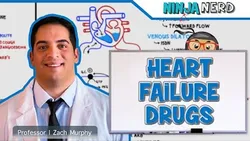
Drugs for Heart Failure 
Heart failure is a serious condition that can be treated with drugs. Beta blockers, RAAS inhibitors, ARNI's, direct vasodilators, diuretics, and ivabradine are all medications used to treat heart failure. These drugs work by reducing the workload of the heart, improving blood flow, and reducing fluid buildup. They can help improve the quality of life for those suffering from heart failure. ▼
ADVERTISEMENT
Course Feature
![]() Cost:
Cost:
Free
![]() Provider:
Provider:
Youtube
![]() Certificate:
Certificate:
Paid Certification
![]() Language:
Language:
English
![]() Start Date:
Start Date:
On-Demand
Course Overview
❗The content presented here is sourced directly from Youtube platform. For comprehensive course details, including enrollment information, simply click on the 'Go to class' link on our website.
Updated in [February 21st, 2023]
Lab
Drugs for Heart Failure Introduction
Pathophysiology of Heart Failure
Beta Blockers
RAAS Inhibitors
Angiotensin Receptor-Neprilysin Inhibitors ARNI's
Direct Vasodilators
Diuretics
Ivabradine
Positive Inotropic Agents
NYHA Chronic Heart Failure Management
Acute Heart Failure Management
Drugs for Heart Failure Practice Problems
Comment, Like, SUBSCRIBE!
(Please note that we obtained the following content based on information that users may want to know, such as skills, applicable scenarios, future development, etc., combined with AI tools, and have been manually reviewed)
1. Pathophysiology of Heart Failure: Learners can understand the underlying mechanisms of heart failure, including the role of hormones, enzymes, and other factors in the development of the condition.
2. Drug Therapy: Learners can learn about the different types of drugs used to treat heart failure, such as beta blockers, RAAS inhibitors, angiotensin receptor-neprilysin inhibitors (ARNIs), direct vasodilators, diuretics, ivabradine, and positive inotropic agents.
3. Management Strategies: Learners can learn about the different management strategies for both chronic and acute heart failure, including NYHA guidelines and practice problems.
[Applications]
After taking this course, students should be able to apply the knowledge they have gained to their practice. They should be able to identify the pathophysiology of heart failure, understand the different types of drugs used to treat heart failure, and be able to apply the NYHA chronic and acute heart failure management strategies. Additionally, they should be able to use the practice problems to further their understanding of the drugs used to treat heart failure.
[Career Paths]
1. Clinical Research Associate: Clinical Research Associates (CRAs) are responsible for the planning, coordination, and execution of clinical trials. They are responsible for ensuring that the trials are conducted in accordance with the protocol, applicable regulations, and Good Clinical Practice (GCP). CRAs are in high demand due to the increasing number of clinical trials being conducted and the need for experienced professionals to manage them.
2. Clinical Data Manager: Clinical Data Managers (CDMs) are responsible for the collection, management, and analysis of clinical data. They are responsible for ensuring that the data is accurate and complete, and that it meets the requirements of the clinical trial protocol. CDMs are in high demand due to the increasing number of clinical trials being conducted and the need for experienced professionals to manage the data.
3. Regulatory Affairs Specialist: Regulatory Affairs Specialists (RASs) are responsible for ensuring that clinical trials are conducted in accordance with applicable regulations and Good Clinical Practice (GCP). They are responsible for preparing and submitting regulatory documents to the relevant authorities, and for ensuring that the clinical trial is conducted in compliance with the applicable regulations. RASs are in high demand due to the increasing number of clinical trials being conducted and the need for experienced professionals to manage the regulatory aspects of the trials.
4. Clinical Trial Coordinator: Clinical Trial Coordinators (CTCs) are responsible for the coordination and execution of clinical trials. They are responsible for ensuring that the trials are conducted in accordance with the protocol, applicable regulations, and Good Clinical Practice (GCP). CTCs are in high demand due to the increasing number of clinical trials being conducted and the need for experienced professionals to manage them.
[Education Paths]
1. Bachelor of Science in Nursing: This degree path provides students with the knowledge and skills to become a registered nurse. Students learn about the pathophysiology of heart failure, as well as the medications used to treat it. They also learn about the management of chronic and acute heart failure, and how to provide patient care. This degree path is becoming increasingly popular as the demand for nurses continues to grow.
2. Master of Science in Cardiology: This degree path provides students with the advanced knowledge and skills to become a cardiologist. Students learn about the diagnosis and treatment of heart failure, as well as the medications used to treat it. They also learn about the management of chronic and acute heart failure, and how to provide patient care. This degree path is becoming increasingly popular as the demand for cardiologists continues to grow.
3. Doctor of Pharmacy: This degree path provides students with the knowledge and skills to become a pharmacist. Students learn about the medications used to treat heart failure, as well as the pharmacology of the drugs. They also learn about the management of chronic and acute heart failure, and how to provide patient care. This degree path is becoming increasingly popular as the demand for pharmacists continues to grow.
4. Doctor of Medicine: This degree path provides students with the knowledge and skills to become a physician. Students learn about the diagnosis and treatment of heart failure, as well as the medications used to treat it. They also learn about the management of chronic and acute heart failure, and how to provide patient care. This degree path is becoming increasingly popular as the demand for physicians continues to grow.
Course Provider

Provider Youtube's Stats at AZClass
Discussion and Reviews
0.0 (Based on 0 reviews)
Explore Similar Online Courses

Google Analytics 4 Tutorial for Beginners (2023)

MongoDB with Python Crash Course - Tutorial for Beginners

Python for Informatics: Exploring Information

Social Network Analysis

Introduction to Systematic Review and Meta-Analysis

The Analytics Edge

DCO042 - Python For Informatics

Causal Diagrams: Draw Your Assumptions Before Your Conclusions

Whole genome sequencing of bacterial genomes - tools and applications

Birth of a drug

Pharmacology


Start your review of Drugs for Heart Failure